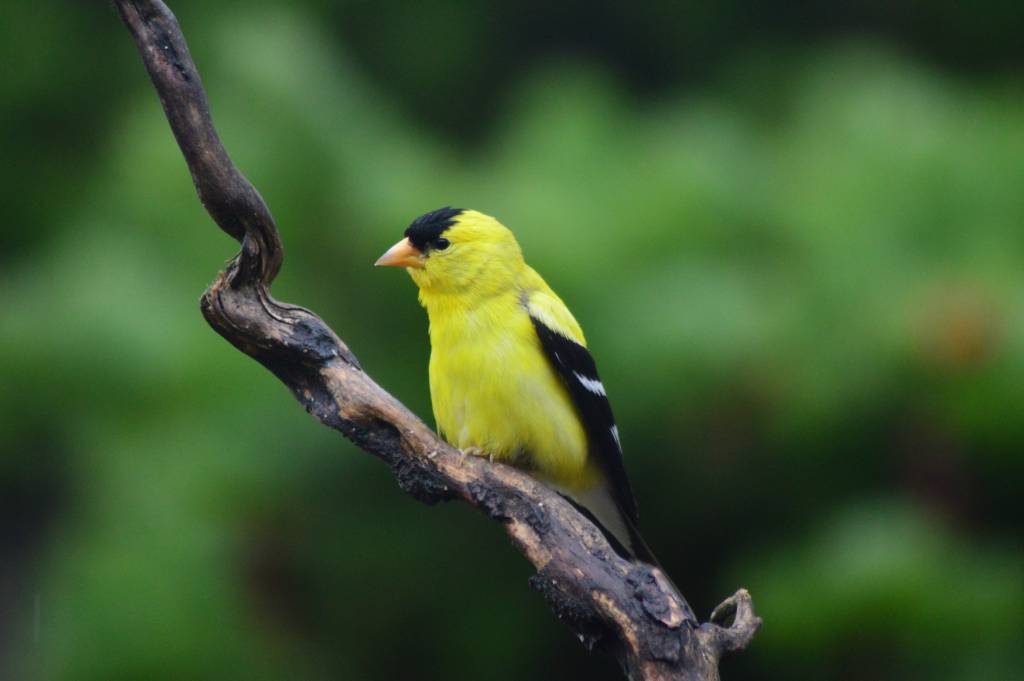 Walking the trail yesterday, I caught a flash of yellow in the wild plum stems—a goldfinch, the first I’ve seen this season. After last week’s snow, I took it as a welcome sign of spring.
Walking the trail yesterday, I caught a flash of yellow in the wild plum stems—a goldfinch, the first I’ve seen this season. After last week’s snow, I took it as a welcome sign of spring.Red-winged black birds perched along the path, spaced out like sentries and trilling their “Who goes there?” from branch and prairie stalk.
I missed the laughter of the creek. A beaver dam once gave the waters their splash, but it has disappeared along with its flat-tailed engineers. Voiceless now, the stream seemed eerie in its silence.
Eerie, too, was the thought that invisible specks neither living nor dead, zombie bits of genetic code, could even then be rafting from person to person on tiny drops of spit.
A scary, new-to-humans virus is loose in the world. Fever? Cough? Loss of smell? Has COVID-19 reached me yet?
As of now we have no immunity, no vaccine, no cure. Only the hope of slowing the onslaught with oft-washed hands and physical distance.
While I’ve been staying home as recommended except for permitted walk-abouts (while staying at least six feet away from anyone we might encounter), I’ve been reading some pages by Reformation leader Martin Luther.
Five hundred years ago, some cities in what is today Germany were experiencing a return of the bubonic plague. This was the same disease that had killed a third of the population of Europe in the 1300s, an estimated 50 million.
In 1527, a few months into an outbreak of plague in his city of Wittenberg, Luther wrote a pamphlet titled: Whether One May Flee From A Deadly Plague.
Steering a middle course between what he saw as the cowardly abandonment of neighbors in need on the one side and the taking of undo risks in the name of faith on the other, Luther commended to his readers his own approach to the plague.
…I shall ask God mercifully to protect us. Then I shall fumigate, help purify the air, administer medicine and take it. I shall avoid places and persons where my presence is not needed in order not to become contaminated and thus perchance infect and pollute others, and so cause their deaths as a result of my negligence.
To my anxious ear, this sounds like a word for our present moment. Look to God. Stand ready to help our neighbor. Do what we can to avoid infection. And try not to carry it to others.
As we step into that challenge, let me offer a prayer for our journey, one set down around the year 400 by a Christian church leader who was living through the fall of the Roman Empire, Augustine of Hippo.
Grant us, dear God,
in all our duties your help;
in all our uncertainties your guidance;
in all our dangers your protection;
and in all our sorrows your peace.
Amen.
Ken Rummer writer
Ken Rummer, a retired Presbyterian pastor, writes about faith and life from the middle of Iowa near the High Trestle Trail. His previous posts are available at http://presbyterianmission.org/today/author/krummer
Luther quotation from Martin Luther’s Basic Theological Writings, 1989, Augsburg Fortress. Prayer from Book of Common Worship, 2018, Westminster John Knox Press.





No comments:
Post a Comment